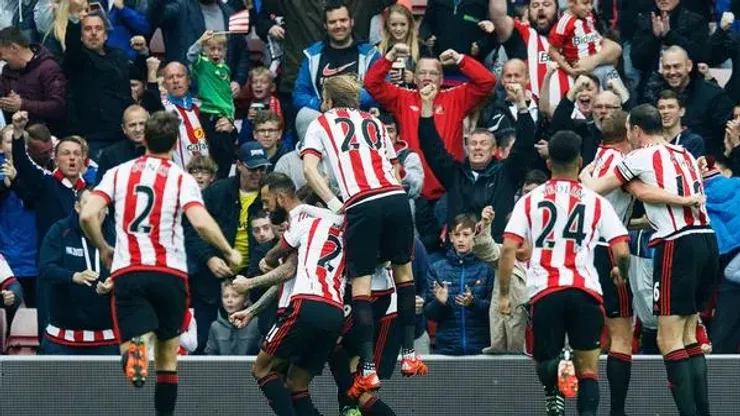Contrary to most media attention, there have actually been two recent Premier League managerial vacancies. The same day as Brendan Rodgers’ Liverpool departure, Dick Advocaat of Sunderland resigned from his post, saying the tools he was given to work with weren’t enough to keep the Black Cats in the Premier League.
“Our squad was simply not good enough,” the 68-year-old former Netherlands coach told Studio Voetbal. “The club knew we had to strengthen ourselves but the chairman never told me how much we could spend. The struggle against relegation is not my cup of tea. It was time for someone else to take over. I became negative and didn’t feel like myself.”
That the squad isn’t that great is easy to see; it’s propping up the Premier League table along with rivals Newcastle United. But for Advocaat to imply there hasn’t been any investment in the team is blatantly false. The club boasted the 12th highest turnover in the league last season along with the eighth highest wage bill of £70 million, up from £58 million the season before.
There has been immense investment in the team. It has simply not yielded returns. The club has been fighting relegation for years now: five points off the bottom three in 2013-14; three points in 2012-13. 2011-12 was the last time Sunderland achieved over 40 points, and even then it was only 45. Nine players came in before the start of this season, 16 last season and 18 two years ago. There is a squad full of internationals with plenty of options, in theory, How have most of these recruits failed to gel so spectacularly?
They’ve not bought from struggling clubs, either. Jeremaine Lens came from a Dynamo Kyiv side that had made the Europa League quarterfinals last season, while Adam Matthews would have been in Europe with Celtic. The players aren’t rubbish, Dick Advocaat wasn’t a rubbish manager, so why did it all fall apart with such depressing regularity?
One theory points to the huge amounts of player and manager turnover. The incomings every season are accompanied by lots of outgoings, often of players who have only just arrived the previous season. It’s impossible for a team to truly play together if they have an inkling that they’re just rentals to put out fires.
Another theory is that Sunderland have seemed to gone away from the style that they play best. Last year, when the team benefitted from Advocaat’s fresh energy and the desperation of a relegation struggle, they played a 4-3-3 formation that meant some big players had to swallow their egos and take one for the team. Jermaine Defoe, scorer of over 100 Premier League goals and who categorically stated he didn’t like playing on the left, had to play wide, along with Conor Wickham. They tracked back, defended diligently, and the focus was on defending deep and narrow. Opponents were encouraged to attack Sunderland through crosses, something their giant goalkeeper Costel Pantilimon was able to deal with relatively comfortably.
MORE SUNDERLAND: Short wants Allardyce talks | Black Cats cast wide net
With the focus on being solid, offensive play was distinctly a secondary concern. The team tied with Aston Villa as the lowest scorers in the division.
This season however, that unity has been lacking. They’ve conceded 18 goals, worst in the division (one more than Chelsea and Newcastle). They’ve scored eight. A goal a game shows that they’re concentrating on attacking play far more than they were last season, but they’re still not on the level of Leicester City, where their offensive guile can cover a lack of solidity.
This new firepower was on display in recent 4-2-3-1 formations, one which basically includes four forwards in Fabio Borini (or Jermaine Defoe), Steven Fletcher, and Jeremaine Lens and Ola Toivonen. While they are all reasonably mobile (aside from Fletcher), they have been pressing forwards this season and trying to win the ball from their opponent rather than dropping deep and daring the opponent to play through them. The discipline has also gone, encapsulated by Lens’ red card against West Ham, when pressing early and hard had seen Sunderland go 2-0 up (they could have been 4-0 up by the end of the half). The egos also haven’t been put aside. Defoe not tracking back like he was last season, when played on the left, perhaps because this early in the season the squad don’t think they will be in another dogfight come March and April.
On paper, this squad is easily good enough to stay in the Premier League. Playing a solid, compact 4-4-2 with Lee Cattermole and Yann M’Vila holding, Defoe and Fletcher as a strike partnership, and Lens and Borini on the wings focussed on tracking back wouldn’t be pretty, but it would be effective. That formation can be modified into a 4-3-3 by dropping a striker and playing another combative midfielder, but Sunderland shouldn’t be trying to fight for possession anyway.
The chance to keep playing in the same vein as last season while feeding off the positivity around Advocaat staying has been wasted. Whoever takes the job will need to pull off something special to keep the team in the top flight.
200+ Channels With Sports & News
- Starting price: $33/mo. for fubo Latino Package
- Watch Premier League, Women’s World Cup, Euro 2024 & Gold Cup
The New Home of MLS
- Price: $14.99/mo. for MLS Season Pass
- Watch every MLS game including playoffs & Leagues Cup
Many Sports & ESPN Originals
- Price: $10.99/mo. (or get ESPN+, Hulu & Disney+ for $14.99/mo.)
- Features Bundesliga, LaLiga, Championship, & FA Cup
2,000+ soccer games per year
- Price: $5.99/mo
- Features Champions League, Serie A, Europa League & Brasileirāo
175 Premier League Games & PL TV
- Starting price: $5.99/mo. for Peacock Premium
- Watch 175 exclusive EPL games per season






